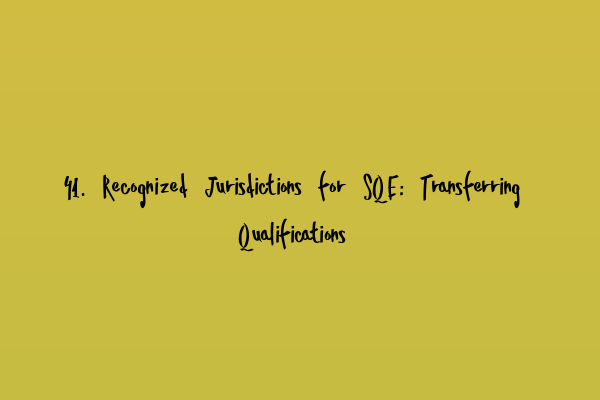41. Recognized Jurisdictions for SQE: Transferring Qualifications
Welcome to another informative blog post from SQE Exam Law, your trusted source for SQE preparation resources and guidance. In today’s article, we will be exploring the topic of recognized jurisdictions for SQE and the process of transferring qualifications. If you are considering pursuing a legal career in a different jurisdiction, this article will provide you with the necessary information to navigate through the qualification transfer process smoothly.
Before we delve into the details, let’s quickly clarify what we mean by recognized jurisdictions for SQE. In the context of the Solicitors Qualifying Examination (SQE), a recognized jurisdiction refers to a jurisdiction whose legal qualifications are recognized by the Solicitors Regulation Authority (SRA) of England and Wales.
Now that we have set the foundation, let’s explore the key steps involved in transferring your qualifications to England and Wales:
Step 1: Research
The first step is to thoroughly research the specific requirements and regulations in the jurisdiction you wish to transfer from. Different jurisdictions have different legal systems and qualifications, so it is crucial to understand how your qualifications align with the requirements of the SRA.
This is where SQE Case Studies: Applying Knowledge in Real-Life Scenarios can be extremely helpful. Our comprehensive case studies provide real-life scenarios that will help you understand how legal principles are applied in different jurisdictions, allowing you to gain a deeper insight into the legal landscape of your target jurisdiction.
Step 2: Contact the SRA
Once you have a clear understanding of the requirements, it is essential to reach out to the SRA to seek their guidance and advice. They will be able to provide you with specific information about the recognition process and any additional requirements you may need to fulfill.
Time management is crucial during this stage, as getting prompt responses and clarifications from the SRA will help you avoid unnecessary delays. To master time management and ensure efficient exam completion, we recommend reading our article: Mastering Time Management in SQE: Strategies for Efficient Exam Completion.
Step 3: Submitting an Application
Once you have gathered all the necessary information and have a clear understanding of the requirements, the next step is to submit an application. This application will typically include the submission of relevant documents such as transcripts, certificates, and references.
Analyzing Mock Results for SQE: Identifying Areas of Improvement can be an excellent resource to help you prepare your application effectively. This article focuses on analyzing mock results to identify areas where you can improve and tailor your preparation to meet the specific needs of your target jurisdiction.
Step 4: Assessment
After submitting your application, it will undergo a comprehensive assessment by the SRA. This assessment will determine whether your qualifications meet the required standards for practice in England and Wales.
It is vital to emphasize that different jurisdictions may have different assessment processes. Therefore, it is crucial to stay updated with the latest requirements and guidelines provided by the SRA.
Once you have successfully completed the assessment, you will be one step closer to practicing law in England and Wales.
Step 5: Additional Requirements
Depending on your jurisdiction, you may be required to fulfill additional requirements beyond the assessment process. These requirements may include additional examinations, interviews, or even completing a certain number of years of legal practice in your home jurisdiction.
Conquer the Multiple Choice Questions (MCQ) in SQE1 is an invaluable resource to help you enhance your skills in tackling multiple-choice questions, which are commonly used in assessments. The strategies and tips provided in this article will help you approach MCQs with confidence and increase your chances of success.
Step 6: Qualification Transfer
Once you have met all the necessary requirements and completed any additional steps, you will finally be eligible to transfer your qualifications. This transfer will enable you to practice law in England and Wales as a qualified solicitor.
Finally, we would like to stress the importance of effective revision techniques throughout your SQE preparation journey. Mastering Effective Revision Techniques for SQE Success offers valuable insights and practical tips to help you optimize your revision process and achieve excellent results.
In conclusion, transferring qualifications to England and Wales requires careful research, effective communication with the SRA, and adherence to specific requirements for each jurisdiction. By following these steps diligently and utilizing the resources available, you can navigate the qualification transfer process successfully and embark on an exciting legal career in a new jurisdiction. Good luck!
